In Colombia: Ser Con El Otro (Being With The Other)
When I got the invitation to support a conference in Colombia, I just had a cursory understanding of the country and its history. Coffee, Shakira, Gabriel Garcia Marquez. I didn't know that the state of Antioquia had its roots in a matriarchical culture. Or that the country was home to 1849 bird species, most diverse in the world. And exotic fruits! Not having watched Narcos, or the more realistic, non-Americanized version El Patron, I was also unaware of the history-altering extent of Pablo Escobar's drug cartel influence. Nor did I realize that the city of Medellin, where I stayed, is starting a radical U-turn from being the "murder capital of the world" to becoming the most innovative city in Latin America.
What I did remember, however, was a recent story that mirrored the Colombian culture's propensity towards generosity.
In 2016, Colombian and Brazil football (soccer) teams were slated to play in the finals of a tournament. Football is a big deal in Latin America. Very few things captivate entire countries the way this game does. It so happened that while one of Brazil's soccer teams was traveling, the entire plane crashed and 70+ players aboard passed away -- right before the finals. An unforgettable tragedy. Brazilian president declared three days of mourning. Colombia could've responded in various ways but they choose to do something unexpected -- they offered the title to Brazil! And whenever Colombians were asked about it, invariably, they would say, "Of course." (For more, see Nossa Chape documentary.)
As I landed at the Medellin airport, a group hug welcomed me. I felt very much at home.
.jpg)
Luzma and Alejandra immediately whisked me away for a village-and-dessert immersion. :) Despite our language barriers, we still managed to share deep stories as we ate the famous desserts of San Antonio Municipio. What did get lost in translation, though, was our attempt to pay-forward dessert for a radiant Catholic nun that had just walked in. :) Since the topic was love, :) we learned that Luzma feeds 16 kinds of wild birds and animals outside her home every day, including rats and bats! "Don't they all come into your house?" "Noooooo! They know me." Anyone who meets Luzma would get the sense that she would love you like a mother, no matter who you were or what you did!
Next morning, a 4 hour workshop on "Cultivating Compassion Quotient" was planned with 100 school principals and educators at a historic venue in Downtown Medellin.
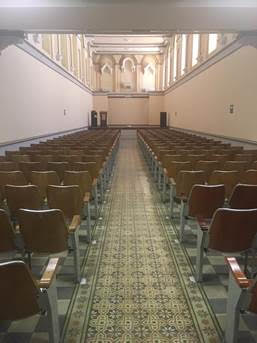 At our workshop, I opened with stories of our recent dialogue with Rachel Naomi Remen, and posed her question of "When was the first time you realized that suffering of others mattered to you?" Building off remarkable stories, we realized how difficult we've made it for today's kids to stay connected to that resource. How do we prepare students for an unknown future? Educators today have ample curriculum to teach compassion, but like Sister Lucy's remarkable example shows us, "We teach who we are." How do we help each other be the change? As a 96 year old Sufi once said, "Values aren't taught. They are caught." Reflecting on this question, the school principals silently wrote a letter of gratitude to a teacher whose values we caught. Then we took a break, with exquisite snacks, :) before brainstorming on power of small nudges, systems thinking, and reinventing schools. The whole event, simultaneously translated in Spanish, created a sacred space of reflection and moved many to tears. Due to word of mouth, it rippled into another talk the next day as well.
At our workshop, I opened with stories of our recent dialogue with Rachel Naomi Remen, and posed her question of "When was the first time you realized that suffering of others mattered to you?" Building off remarkable stories, we realized how difficult we've made it for today's kids to stay connected to that resource. How do we prepare students for an unknown future? Educators today have ample curriculum to teach compassion, but like Sister Lucy's remarkable example shows us, "We teach who we are." How do we help each other be the change? As a 96 year old Sufi once said, "Values aren't taught. They are caught." Reflecting on this question, the school principals silently wrote a letter of gratitude to a teacher whose values we caught. Then we took a break, with exquisite snacks, :) before brainstorming on power of small nudges, systems thinking, and reinventing schools. The whole event, simultaneously translated in Spanish, created a sacred space of reflection and moved many to tears. Due to word of mouth, it rippled into another talk the next day as well.
Educators in Medellin really have to be called the unsung heroes of social transformation. They are not only training the next generation of leaders, but also shaping the narrative of nonviolence and compassion.
The history of Medellin, and Colombia, is complicated. One of its storylines is filled with tremendous violence. When you Google Colombia, you’ll see this auto-generated question: "Will I get kidnaped in Colombia?" To this day, Downtown Medellin goes quiet after dark. From here, Pablo Escobar built a cocaine empire that was doing 70 million dollars of business *everyday*, and because of which he had killed 25 thousand people. Left-wing guerillas, right-wing paramilitary and government had been sparring for decades, until 2012 when Colombian President Juan Manuel Santos -- also Nobel Peace Laureate -- brokered a peace treaty after many years of untiring effort. Naturally, scars of such history can’t just get erased overnight. Peace hangs by a delicate thread, particularly after Santos retired as president last year. Still, the mood in the country is one of hope as innovation is in the air, tourism is gradually increasing, and young people are overwhelmingly ready for change. As this street graffiti says, "Less Guns, More Dreams":
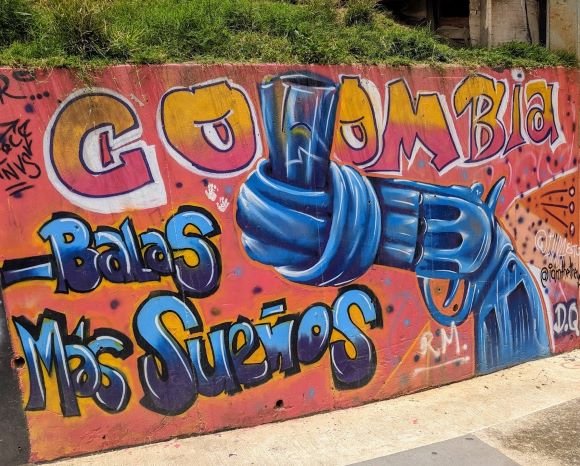
In the first row of the workshop, an engaged professor named Enrique was beaming with resonance. When I first asked him what he does, he replied, "Well, mainly, I just live." Once you get to know him a little bit, he’ll expand further: "You could say I'm a monk in plain clothes." After his PhD, he taught at Bowdoin College in Maine, then lived in Christian monasteries for a while and eventually felt a call to move to his motherland in Colombia. By a stunning series of serendipities, a job found him within a week -- as a professor at Colegiatura.
Colegiatura is a reputed college in Medellin that started 30 years ago and is unabashedly rooted in inner transformation. That is also partly what drew me to Colombia. All its thousand-plus students are required to take four courses that promote self-understanding. Communication, creativity and happiness are core to all their curriculum. Julio Salleg, founder of the college, is deeply inspired by Aurobindo's vision that both our minds and matter can -- and need to -- evolve, for creating a more beautiful world. Nestled in nature, you can read "Ottro Mundo" (Another World) right as you enter the parking lot. It's a home for many new, unconventional, and seemingly impossible dreams. OtroMundo es posible -- another world is possible.
Our main conference was hosted at Colegiatura, with this inspired theme: Being with the Other. Ser Con El Otro.
Five everyday youth, from a transgender chef to a young woman with Down syndrome, opened the conference. Many inspired speakers from around the globe shared their vision of being with the other, but I particularly learned a lot from the Colombian speakers. Henry Garcia shared his difficult encounters with extreme violence in Colombia, only to then be inspired to co-build libraries with the guerilla groups as an excuse for reconciliation. Aldelaida Lopez spoke about how she is revolutionizing education with arts and everyday encounters to reduce our othering. Her schools across the country teach 14 thousand students everyday. Mauricio Serra introduced everyone to his research on "objectification", and our inevitable disconnection if we view life as a series of encounters with replaceable, one-dimensional objects. Businessman Aldo Civico told stories of how Otto Scharmer’s four stages of listening have influenced him: downloading, conversing, empathizing, and tuning into the collective emergence.
In perhaps the most humorous, and uplifting talk, a blind-man named Jorge Colmenares spoke about how “inclusion is exclusive” these days, but we can change that if we design not just for sight, taste or smell, but for touch. My interpretation of it :) was that our consciousness is predicated on our capacity to feel sensations, and that is the most common denominator of being sentient. If we are able to design for that, instead of sight, we could usher in a new era of inclusiveness. And Jorge is doing just that, most recently with the Gold Museum in Bogota.
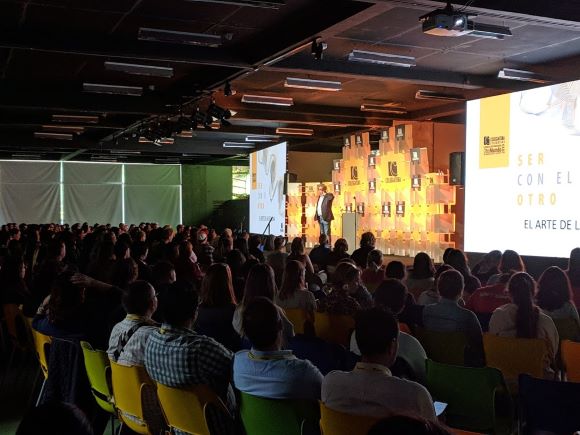
By the end of the second day, I closed the conference with ServiceSpace design principles. To be with the other, from our experience, requires a shift from accumulation to flow. Today's systems are designed to amplify -- and glorify -- accumulation, when, in fact, if we optimize for flow, we would unlock a lot more connection and potential. Science gives us a rudimentary idea of an internal state of flow, but as we experience its nuances first hand, we can skilfully practice “social permaculture” not merely personally but also collectively. At the intersection of personal practices, inter-relational emergence, and systemic archetypes that encourage flow, we find a new form of leadership -- what we call Laddership.
From that point of view, flow isn’t a sacrifice of accumulation but rather a celebration of life’s ongoing dance.
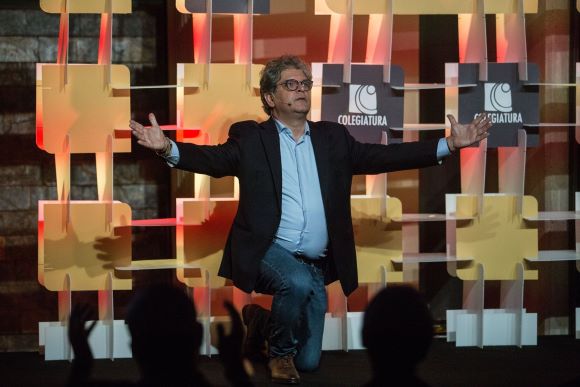
While the Internet has given this wings, particularly within the ServiceSpace context, this is an ancient idea at its core.
Luzma, an anthropologist and a Director at Cole, told me a great story: "In the indigenous cultures of Colombia, whenever someone would pass away, they would cremate the body with all their possessions. They would use the ashes in the cooking process for plantains, and while sharing that meal, they spoke fondly about the one who had passed. Then -- never again. It was understood that one who passed was now a part of us, quite literally, and it would incumbent on us to carry forward their values in the world. Instead of building up a mirage of individuality, our identity is seen as the sum of our resonant relationships."
Just walking with Luzma on campus is an exercise in this wisdom. Everyone from janitors to students to staff voluntarily greet her as if she belongs to them. No other, not because of an intellectual ideal, but simply because the island of one's own ego has started to dissolve.
I arrived in Colombia not knowing anyone, but I left with a family. Whatever I shared was fairly simple, but an invitation for a selfless connection invariably magnetizes a certain energy.
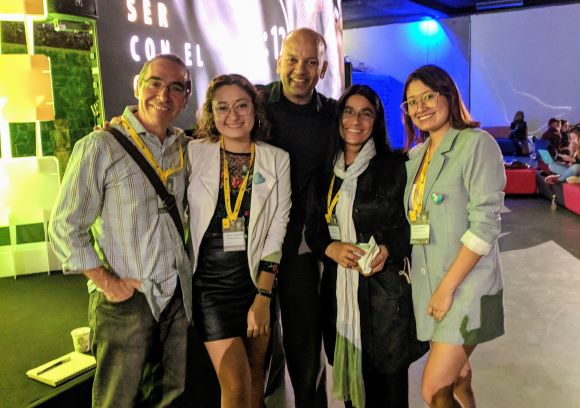 I took 32 kilograms of goodies, mostly 21-day Kindness Challenge diaries, but also Smile Cards, Decks, magazines, CD’s and such, and it was all gone. They had even printed more material locally. Enrique is translating more 21-day challenge booklets so they can spread to more non-English speakers. Two very dear sisters -- Alejandra and Paulis, who described SSp exposure as “life changing” -- are going to start Karma Kitchen. I gave them a heart pin each, and the next day, they both had it as a part of their outfits. :) With various speakers, we are plotting new ideas and synergies. Juan Camila is intending to start a Laddership Circle in Spanish: “Dear Nipun, amigo, parcero, hermano, take my word, this doesn't stop here." The college had offered me an honorarium, and when I told them that I would like to keep that capital in Colombia, to support more ripples of generosity, the organizer was moved to tears. And Luz-Mama wrote me this touching note, “I revere your soul. I thank you for giving so generously in so many ways. I wish you the very best and I confirm that my house is your house when you are in Colombia. I embrace you from the soul.” I could’ve said the same thing to her.
I took 32 kilograms of goodies, mostly 21-day Kindness Challenge diaries, but also Smile Cards, Decks, magazines, CD’s and such, and it was all gone. They had even printed more material locally. Enrique is translating more 21-day challenge booklets so they can spread to more non-English speakers. Two very dear sisters -- Alejandra and Paulis, who described SSp exposure as “life changing” -- are going to start Karma Kitchen. I gave them a heart pin each, and the next day, they both had it as a part of their outfits. :) With various speakers, we are plotting new ideas and synergies. Juan Camila is intending to start a Laddership Circle in Spanish: “Dear Nipun, amigo, parcero, hermano, take my word, this doesn't stop here." The college had offered me an honorarium, and when I told them that I would like to keep that capital in Colombia, to support more ripples of generosity, the organizer was moved to tears. And Luz-Mama wrote me this touching note, “I revere your soul. I thank you for giving so generously in so many ways. I wish you the very best and I confirm that my house is your house when you are in Colombia. I embrace you from the soul.” I could’ve said the same thing to her.
Even without words in the same language, so many of us were harmonizing with the universal song of love.
Being with the Other. Ser Con El Otro. Together, we are all stronger.
I never imagined that I would talk Smile Cards and kindness and gift-ecology in a context like Colombia. We just try to bloom wherever we are planted. And trust in the “flow” to plant us where we need to bloom. Yet, here I was. It fills one with gratitude to be a small part of this grander arc that bends towards love.
Guri joined me for the last couple days, as our field of blessings continued to expand.
One of the visits we particularly enjoyed was a trip to Comuna 13. It was Medellin’s epicenter of violence, whose tales of torture are almost too gruesome to retell. To this day, most locals will discriminate against you if you mention that you’re from this Sector 13. Yet, it’s a story of profound social transformation -- with art. Spray-paint-on-wall kind of “graffiti” art. On practically every open wall, locals have created a myriad expression of art that bears witness to their suffering and shares hopes for the future. “Eyes” are commonly featured, to honor their belief that the universe is always watching. No action goes unnoticed by the field of consciousness.
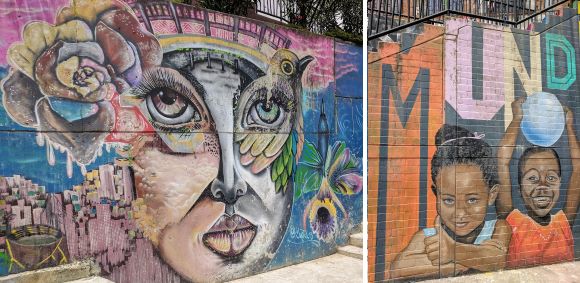
It’s stunning. The whole thing. Remarkable. In the last couple of years, many new projects have started, government has started to support new ideas, more people have started to visit, and the community is rebuilding itself.
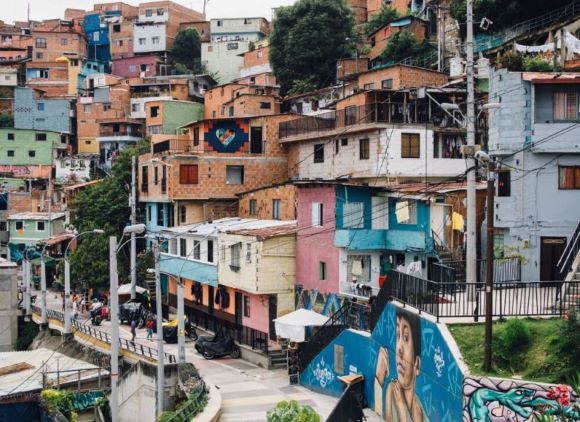
Daniel is a young local who took us around, while translating, for several hours of interactions spanning many miles of walking. As we were heading down, on the outdoor public escalators, an old man just happened to cross us. Ivan. Daniel explained how Ivan has lived in Comuna 13 for decades and is one of the pillars of the community. Needless to say, he’s seen a lot. By the age of 4, he had lost both his parents and survived with his “street skills”. What was remarkable is how he, now at the age 71, dons the most glorious smile on his face. It was an indication of a man with inner substance.
We really hit it off, even without direct language communication. As Guri and I probed his wisdom, he was surprisingly crisp and clear. Not a college degree kind of educated, but wisdom school kind of educated. He kept walking with us, and even laughed, “I don’t know why I’m walking all the way down, but I am.” (On his way back, it would be a tough uphill climb, particularly at his age.)
Feeling into his energy, you wouldn’t think that he could ever harm a fly. “How did you manage to stay nonviolent amidst all this violence?” All of a sudden, he got very sincere, raised his index finger and said, "This is very important. God teaches us that if someone slaps your left cheek, you offer your right." For him, this came from the teachings of Christ, but he felt this was universally true. I probed further, "But how come others aren't able to practice that, but you are?" He just smiled his toothless smile as if to imply that grace cannot be communicated by words. :)
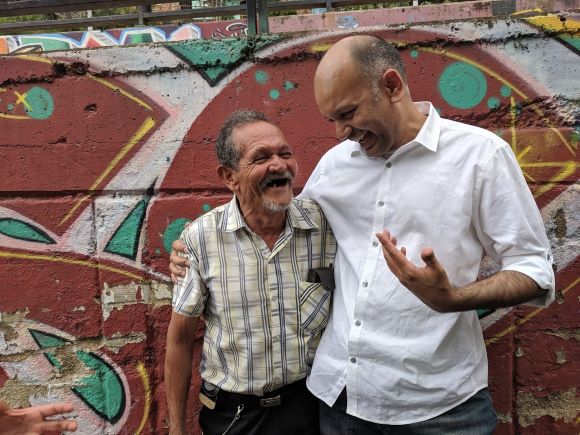
What are the odds that we would literally run into this beacon of nonviolence, in one of the more violent places on the planet?!? But we did. :)
As we parted, he drew an invisible cross across my chest and said, "Blessings."
We all felt blessed, and bound in an infinite circle of love.
Muchísimas gracias, Colombia!
Posted by Nipun Mehta on May 14, 2019
SHARE YOUR REFLECTION
17 Past Reflections


On May 15, 2019 Victoria Crawford wrote:

On May 15, 2019 Aryae Coopersmith wrote:

On May 15, 2019 Janessa Gans wrote:

On May 15, 2019 Sally Mahe wrote:

On May 16, 2019 Rohit Rajgarhia wrote:

On May 16, 2019 Rajalakshmi SRIRAM wrote:



On May 16, 2019 Angela wrote:

On May 16, 2019 Elizabeth Pimentel-Gopal wrote:

On May 28, 2019 Patricia Prada Jimenez wrote:


On Apr 30, 2024 무료웹툰 추천 wrote:

On Apr 30, 2024 웹툰순위 wrote:




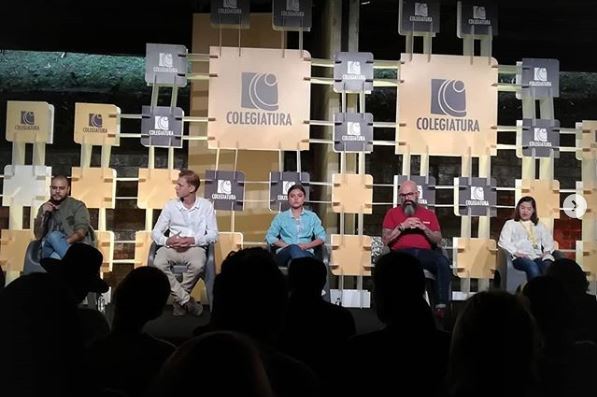
On May 15, 2019 Madeleine G. Boskovitz wrote:
1 reply: 무료웹툰 | Post Your Reply